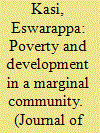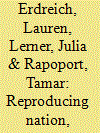| Srl | Item |
| 1 |
ID:
102751


|
|
|
|
|
| Publication |
2011.
|
| Summary/Abstract |
The concepts of poverty and development have many meanings in contemporary globalized societies. Development by definition implies desired changes in terms of livelihood, improved quality of life and better access to assets and services, etc. However in reality development programmes sometimes have negative consequences, perhaps unintended, multiplying the acute scarcity of resources and opportunities, or reproducing poverty. Also, the consequences of developmental programmes often appear to be out of focus, and seen at the ground level, there seems to be a gap between what is intended and what is actualized. In this framework, this paper presents a case study of the social, cultural and economic correlates of the development processes in Adadakulapalle, a settlement of Sugali peoples, once a semi-nomadic tribe, in Anantapur District of Andhra Pradesh, South India. The paper shows how factionalism and faction politics affect the implementation of development interventions. It also looks at the poverty in the settlement and focuses on the types of change that people have experienced with the implementation of different schemes by both government and other agencies. The type of change is discussed in the present study through the macro and micro analysis of development programmes.
|
|
|
|
|
|
|
|
|
|
|
|
|
|
|
|
| 2 |
ID:
073595


|
|
|
|
|
| Publication |
2005.
|
| Summary/Abstract |
This paper discusses the reproduction of hegemony and social hierarchy through education. It brings together two case studies of marginal groups at a university-Russian Jewish immigrants and Palestinian Israeli women-who make sense of their position in social hierarchies and power relations through constant interpretative work on the various dimensions of university knowledge. The article reveals how marginal actors' interpretations of knowledge simultaneously are guided by students' positioning vis-à-vis the dominant collective and also articulate and redesign positioning. The two groups redesign their marginalities vis-à-vis the Israeli-Jewish collective by transforming knowledge to identity. In so doing, these groups reproduce national borders of Israeli social hierarchy, while working to change the meaning of these borders for their group's positioning.
|
|
|
|
|
|
|
|
|
|
|
|
|
|
|
|